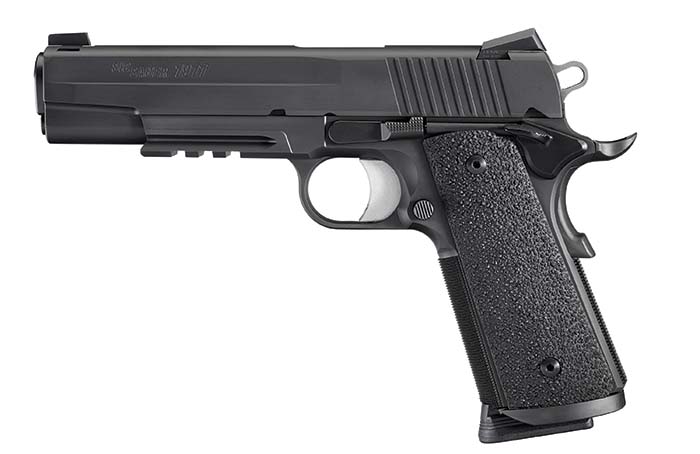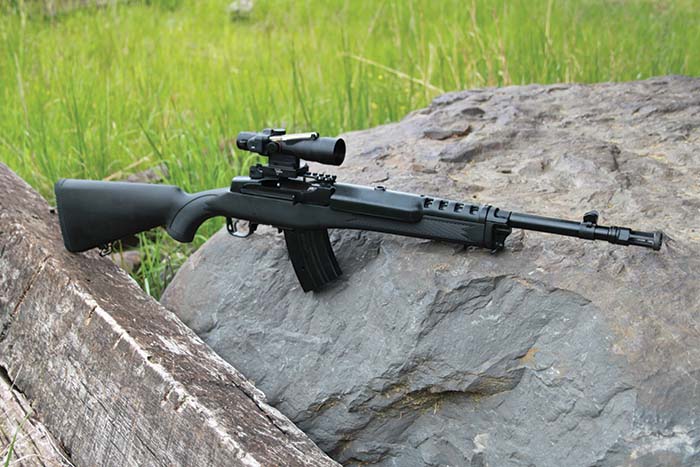The author finds the SIG Tacops an excellent modern service pistol on every count.
By Bob Campbell
It is no secret that the greatest fighting pistol of the previous century, and this one, is the 1911A1 handgun. Reliability, hit probability, practical accuracy, speed to an accurate first shot and excellent handling make the .45 Automatic a first rate choice for personal defense and service use. Among the most desirable of the modern 1911 handguns are the many versions by SIG Sauer. The Tacops (Tactical Operations) is a distinctive handgun based upon the proven SIG 1911 handgun. It is similar to earlier pistols from this maker, beginning with the GSR. The Tacops in the eyes of many is the pinnacle of late model SIG tactical model production. The Tacops is a full size (Government Model) 1911 with a five inch barrel, ambidextrous safety, Novak sights with tritium night sight inserts, a pronounced beavertail grip safety, an extended slide lock, a well designed magazine well funnel, and hand filling Ergo grips. The grips offer excellent adhesion when firing with sweaty or cold hands and are a good feature.


Novak front and rear sights give the user every advantage in rapid fire or precision work.
The pistol’s slide is of a different contour than most 1911 handguns and is subtly different from the Colt 1911 in order to more closely resemble the SIG P series pistols. Be certain that you are aware of the differences in the SIG and other 1911 handguns as conventional holsters will not fit the SIG 1911. The Tacops features an external extractor in the modern fashion. The well designed ambidextrous safety features levers that are smaller than most safety levers. They are not likely to be rubbed off when carried in the holster, and they are positive in operation, locking solidly in their indent. An excellent feature adding to the adhesion of the Ergo grip is front strap abrasion with 25 lines per square inch checkering. This is a pistol with plenty of abrasion for good gripping in firing heavy loads. The pistol also features an M1913 Picatinny rail for mounting a rail light or laser as you prefer. This is an important feature and a desirable one in a modern combat pistol. The SIG Tacops was tested with the Insights M3 weapon mounted light with good results. In the most important feature for accuracy potential the barrel was found to be well fitted to the slide and barrel bushing. The locking lugs rolled into the slide cuts well and the slide was very smooth in operation. The pistol does not use a full length guide rod. The original guide rod and full power spring is a good set up and affords the user more ease in field stripping and maintenance. The pistol is supplied in a lockable case with a total of four magazines. Three magazines is a minimum, with one in the gun, one on the belt and one resting. Four magazines is something I like very much. These are modern 8-round magazines with a plastic base pad. They proved feed reliable during testing. The combination of a well designed magazine guide well and these rubber base pads ensured that the pistol could be kept in action quickly and smoothly. During testing D & L Sports Quad magazine carriers were used (DLsports.com). This is a robust no nonsense magazine carrier designed for service use. The magazines are kept secure and offer the correct geometry for a rapid deployment. The front row is more accessible and the angle is ideal for a fast grab and load. The two magazines on the back row are accessible once the front magazines are deployed. Overall, a sensible, well designed and rugged addition to the belt and tactical load.
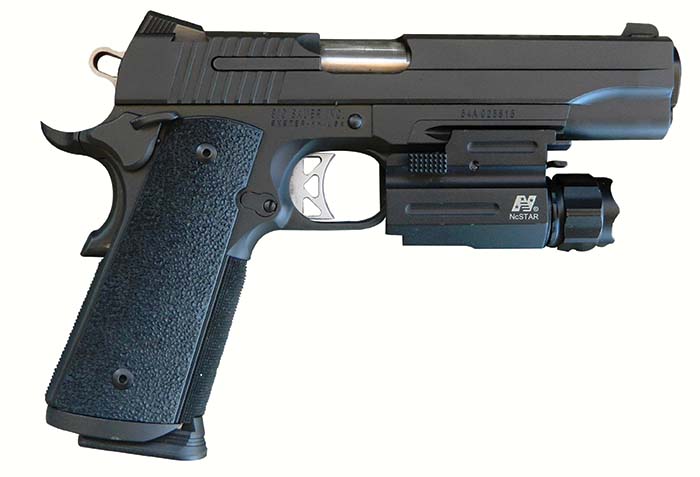
Trigger action is important and trigger compression should be smooth and consistent. The SIG Tacops is smooth but heavier than some SIG 1911 handguns we have tested. Trigger compression was 6.25 pounds. Good shooting was done; the action is smooth and reset rapid. The SIG Tacops is fitted with the Series 80 firing pin block that all SIG 1911 handguns use. Like it or not the drop safety is here to stay and does not impede a good trigger action unless you are going to attempt an ultra-light competition pull weight. In any case, a maker that does not design a firing pin block into his handgun is probably going to abrogate institutional sales. The trigger was useful for combat shooting and did not impede good practical accuracy.
The SIG Tacops balances well in the hand. Due to all steel construction, the blocky slide and the addition of the Picatinny rail, this SIG is heavier than non rail guns, at about 41.5 ounces unloaded. In a day when many are moving to lighter service pistols this is no lightweight. A Colt Series 70 on hand for comparison weighs in at 39 ounces. The weight is not noticeable on the hip compared to a standard 1911, however, when firing the pistol with +P loads, the SIG is noticeably more comfortable. Part of this is due to the extra weight and some of the credit goes to the well designed beavertail and grips. The initial inspection of the SIG showed that it is well fitted. Trigger compression is good, the fit of the barrel is good, and the controls are tight and crisp. The safety in particular locked into its indent in a positive manner. The Nitron finish applied over the stainless steel SIG is a form of ferritic nitrocarburizing that is similar to case hardening. This finish diffuses nitrogen and carbon into the steel to add scuff resistance and resist corrosion. The finish is evenly applied and businesslike as well as non reflective. If you like the non reflective black finish then the SIG Tacops will appeal to you. After a few dozen presentations from a tightly fitted holster the Tacops finish is not worn to any perceptible extent.
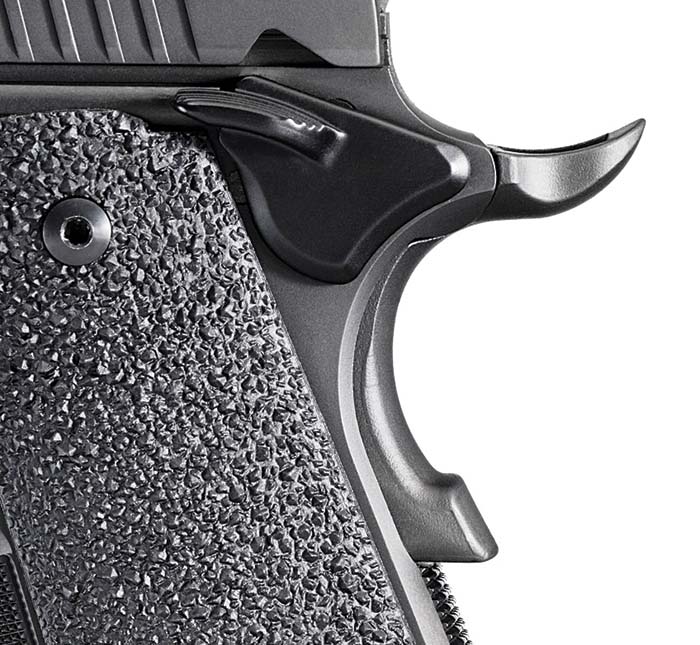
During the evaluation we used a modern tactical magazine carrier from D & L Sports, Dave Lauck. This carrier holds four magazines. The first two are used and then the back row are drawn during tactical drills. This carrier is well made of heavy duty Kydex and represents a viable option for carrying spare magazines on the duty belt. It makes it easier to have an appropriate number of magazines on the belt for instant access. As for gun leather, the range work was accomplished with a high ride holster from Crossbarsleather.com. This holster offers three belt loops for good adjustment of the cant or angle and afforded a good sharp draw. From Alien Gear (Aliengearholsters.com) comes a credible choice for concealed carry. This IWB features a Kydex holster that is impervious to solvent, oil and perspiration. The balance of speed and retention is good, with the pistol held securely during movement. The leather backing is of 12 ounce leather, making for a comfortable base upon which to mount the Kydex holster. The belt attachment clips are adjustable for low or high ride. Overall this is credible gear that will give good service.
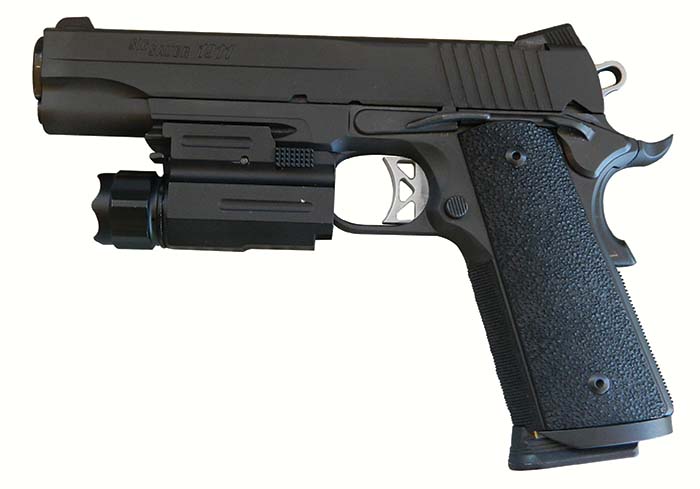
At present the ammunition shortage continues unabated. Testing a handgun is sometimes challenging as adequate supply is seldom found. However, I firmly believe that you are better to fire the ammunition and achieve proficiency rather than hoard the ammunition. The pistol was fired during the acclimation stage with Black Hills Ammunition 230 grain FMJ loads. Sight regulation was ideal for this loading, with the big ball striking just above the point of aim. The SIG Tacops is fast from leather and comes onto target quickly. The weight of the pistol is ideal for firing full power ammunition. While a lighter handgun might be faster from leather – and the same is true of a shorter 1911 – once in the hand and on target there is no handgun easier to control with full power .45 ACP ammunition. The SIG Tacops is clearly well suited to personal defense, service use or use by a tactical team of any type.
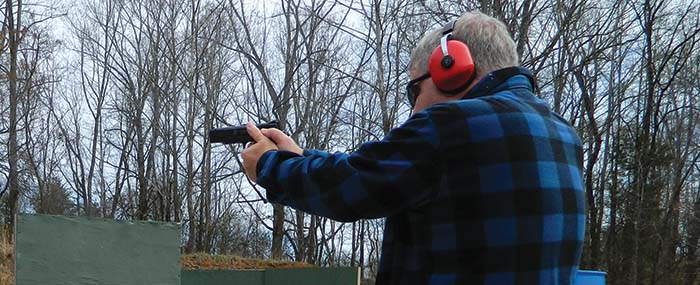
Moving to loads using an expanding bullet the Black Hills Ammunition 185 grain +P TAC load was tested. TAC load, Tacops seemed a good match. This loading uses the Barnes X bullet. A solid copper design, the nose of the bullet folds open into a petal like profile in expansion testing. The bullet is one piece and has no core to separate. The nose expands and folds to the base. The base is solid and this design ensures good penetration – the single most important factor in wound ballistics. Expansion is simply a bonus. A combination of shot placement and a load with good wound ballistics results in a high level of protection for the user.
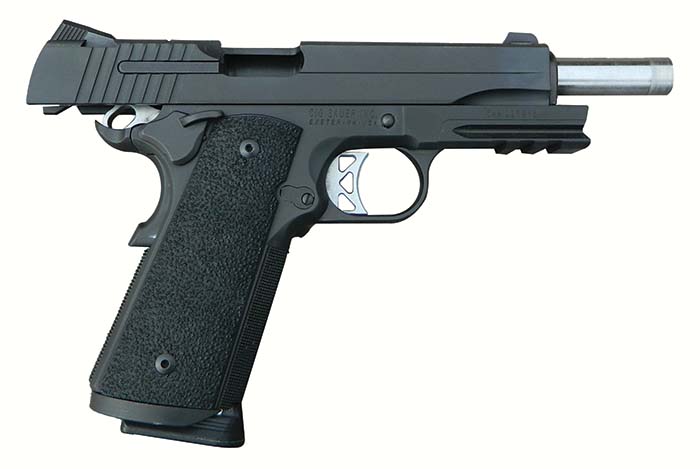
The SIG Tacops, like all quality handguns, prefers one load to the other. The 1 in 16 inch rifling twist of the .45 ACP barrel is intended to stabilize standard weight 230 grain bullets. The bearing surface, not the weight, is what means the most and the barrel has proven to stabilize bullets of weights from 160 to 260 grains while rendering good accuracy. The long but light for the length 185 grain TAC bullet gave particularly good results, with a singular group of five shots at 25 yards of 1.9 inches. The average of three groups fired with this loading was 2.3 inches. The 230 grain ball load was not far behind. Even the least accurate loading tested, a handload using the Oregon Trail 230 grain RNL bullet at 780 fps, was accurate enough for most uses with a 25 yard 3.5 inch group. The SIG is an accurate handgun by any definition, well suited to service and personal defense.
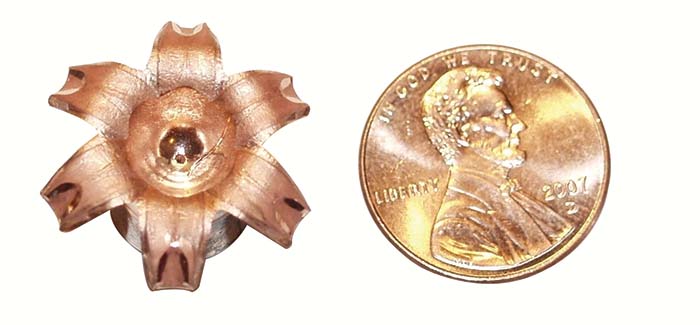
With a manufacturer’s suggested list price of $1,213 the Tacops pistol isn’t cheap. But it is in line with most service pistols with similar features. The pistol is reliable, well fitted and finished, and features night sights, Nitron finish, and a well fitted barrel and bushing. When all is said and done, the Tacops is a handgun well worth its price and a service grade handgun worthy of our respect.
| This article first appeared in Small Arms Review V19N3 (April 2015) |



